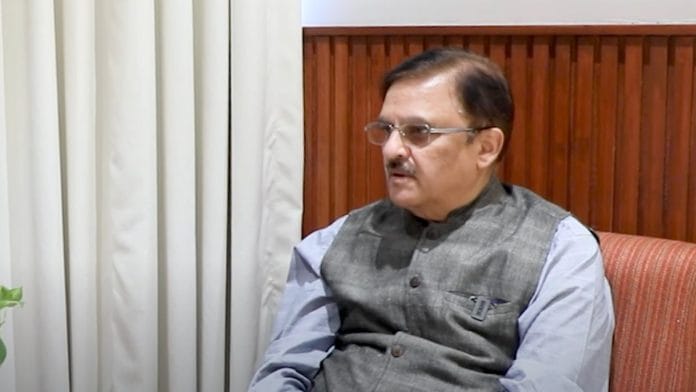New Delhi: Former Supreme Court judge, Justice Abhay S. Oka, who demitted office in May this year does not support the view that transparency in judicial appointments can be brought in by publishing Collegium resolutions on websites. Rather, he feels, it could compromise the privacy of lawyers, chosen to become judges, and also affect their practice.
According to Justice Oka, transparency should be introduced in the basic process for such appointments. In an interview with ThePrint, Justice Oka said aspects of the appointment process that should be made public would include how many candidates the Collegium is considering, how the candidates are finalised and the manner adopted to select them.
“Today, if some lawyer is made aware that his entire thing such as income, drawbacks in his personality are to be made public, he may not give consent,” said the former judge.
Justice Oka shared his apprehension over a layer of scrutiny added to the appointment procedure for HC judges—Supreme Court Collegium’s interaction with candidates recommended for judgeship. He advised that the interaction should not be converted into an interview and become the only basis for the Collegium’s decision. “We have to actually consider what is the nature of interaction and how much weightage is given to the interaction,” he said.
On appointments to the Supreme Court, Justice Oka said it was “impossible to avoid controversy” on the subject. “It is such an important post,” he said.
Justice Oka, however, explained that there has to be diversity in Supreme Court appointments and to ensure this, seniority of a HC judge cannot be the only ground for his/her elevation.
“Diversity is not only in terms of caste, religion or minority group. It is about the region also. Every state must get representation. If diversity has to be there, you cannot look at all-India seniority,” he said.
Speaking about himself, he said when he was elevated to the top court, there were seven to eight judges who were junior to him in the all-India seniority level. But there was no fault in their appointment because they represented their state.
“If you follow seniority, then you will say diversity is not being followed; and if you look at diversity, you will say seniority has not been followed,” Justice Oka said in a lighter vein. Apart from diversity, calibre, integrity and quality of the candidate are essential elements for a HC judge’s appointment to the top court, he said.
On the government’s pick-and-choose policy while notifying appointments, Justice Oka said the central government is involved in the appointment mechanism from the first step. Delay in appointments causes practical difficulty for lawyers.
“When I became a judge, no resolution was being uploaded on the website. There could be some kind of secrecy. Today, if a resolution of SC goes on the website, if the lawyer’s name becomes public, no briefing lawyer goes to hire a senior or an advocate selected to become a judge. So, how will this lawyer survive if his name remains pending with the government for appointment purposes?” added the former judge, asserting that the law on this point is very clear, which is appointments should be done expeditiously.
Touching upon the spate of transfers of HC judges, Justice Oka said there is a need to relook at the old transfer policy and spell it out so that the terms of transfer are known to all.
Justice Oka expressed his reservation over the Bombay High Court’s new Kolhapur bench, inaugurated recently by Chief Justice of India (CJI) B.R. Gavai, and felt that the decision-making process to start it was flawed, apart from being unwarranted. He condemned the growing tendency of senior judges criticising junior judges. “This should not happen. Through their judgments, judges should be critical of judicial decisions and not of a judge. Complaints (against any judge) can be made on the administrative side,” he added.
According to him, in view of an earlier full court resolution of the HC, not supporting creation of an additional bench, the Chief Justice (of Bombay HC) should have discussed the issue with other judges before taking an administrative decision on it.
He held a similar view on the Chief Justice of India’s (CJI) administrative authority and said that administrative decisions should be taken unanimously, after discussing them in the full court, and not unilaterally. Justice Oka appreciated the efforts of former CJI Sanjiv Khanna and incumbent CJI B.R. Gavai for issuing administrative orders only after consulting other top court judges. Giving an example, he cited CJI Gavai’s order to remove the glass panels that were installed under former CJI DY Chandrachud’s tenure.
Justice Oka also spoke regarding the 2018 press conference held by the then sitting judges of the top court on arbitrary listing of cases in the Supreme Court and said in his personal opinion that was not the correct approach. “A sitting judge should not speak to the media. There are other ways to resolve a grievance,” he said.
(Edited by Viny Mishra)






